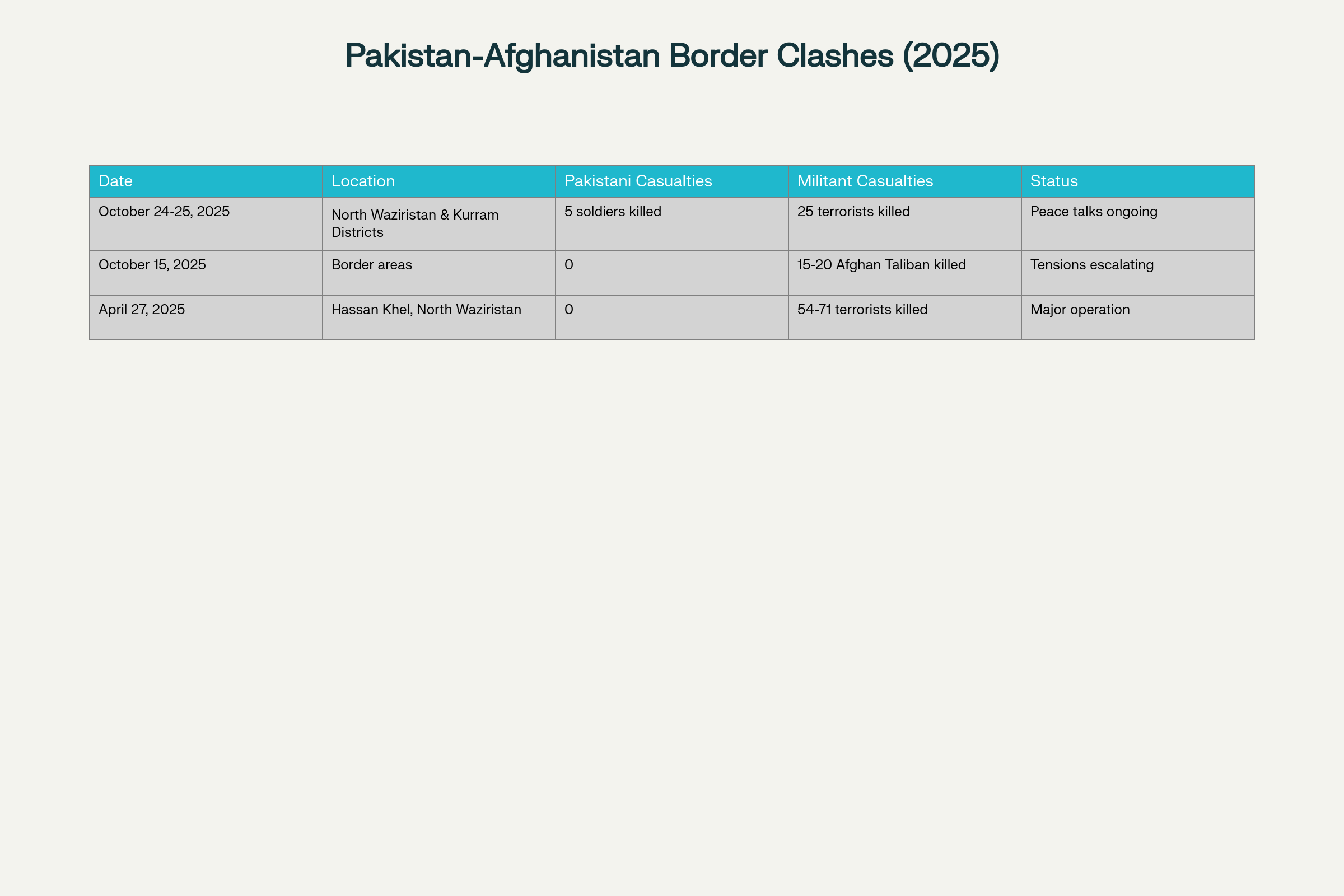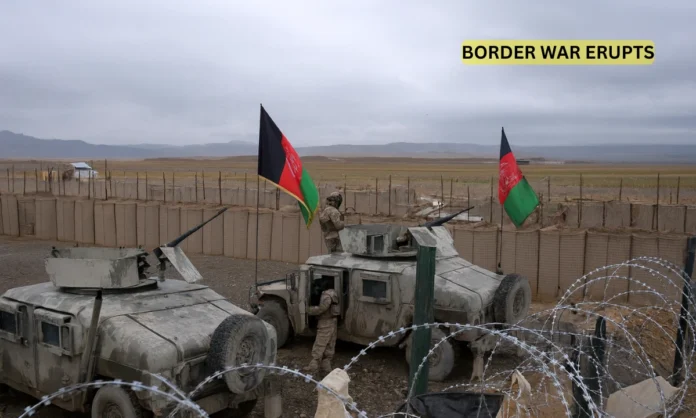Key Highlights:
- Pakistani security forces killed 25 militants while losing 5 soldiers in fresh border clashes on October 24-25, 2025
- The deadly confrontations occurred during ongoing peace talks in Istanbul, raising questions about Taliban commitment to curbing terrorism
- Pakistan’s Defence Minister warns of “open war” if diplomatic negotiations fail to produce lasting agreement
The Pakistan-Afghanistan border erupted in deadly violence over the weekend as Pakistan-Afghanistan border clashes claimed the lives of 25 terrorists and 5 Pakistani soldiers, marking a dangerous escalation despite ongoing peace negotiations in Istanbul. The latest Pakistan-Afghanistan border clashes occurred when militants from the banned Tehreek-e-Taliban Pakistan (TTP), officially designated as “Fitna al-Khwarij” by Islamabad, attempted to infiltrate across the rugged northwestern frontier on October 24-25, 2025. These Pakistan Afghanistan border clashes have cast serious doubts on the Taliban government’s commitment to preventing terrorism from Afghan soil, according to Pakistan’s Inter-Services Public Relations (ISPR).
Deadly Infiltration Attempts Threaten Fragile Ceasefire
- Pakistani forces detected two large militant groups attempting cross-border infiltration in Kurram and North Waziristan districts
- The confrontations resulted in the highest single-day militant casualties in recent months during active Pakistan-Afghanistan border clashes
The Pakistan-Afghanistan border clashes unfolded when security forces identified movements of heavily armed terrorist groups near Ghaki in Kurram District and Spinwam in North Waziristan District during nighttime operations. Pakistani troops engaged these infiltrating militants in precise counterterrorism operations, killing 15 terrorists including four suicide bombers in North Waziristan, while eliminating another 10 militants in Kurram District. The Pakistan-Afghanistan border clashes proved costly for Pakistani forces, with five soldiers making the ultimate sacrifice: Havaldar Manzoor Hussain, Sepoy Nauman Ilyas Kiyani, Sepoy Muhammad Adil, Sepoy Shah Jehan, and Sepoy Ali Asghar.
Military officials recovered substantial weapons caches, ammunition, and explosives from the eliminated terrorists, indicating the scale of the planned infiltration during these Pakistan-Afghanistan border clashes. The timing of these Pakistan-Afghanistan border clashes coincided directly with diplomatic negotiations in Istanbul, where Pakistani and Afghan delegations were attempting to forge a lasting peace agreement.
Open War Warning Escalates Diplomatic Pressure
- Pakistan’s Defence Minister Khawaja Asif threatens “open war” if Istanbul peace talks fail to produce concrete results
- The warning represents the strongest diplomatic language used by Pakistani officials regarding Afghanistan tensionss3.amazonaws
Pakistan’s Defence Minister Khawaja Asif delivered a stark ultimatum regarding the Pakistan-Afghanistan border clashes, declaring that failure to reach agreement in Istanbul negotiations would result in “open war” between the neighboring countries. Speaking from Sialkot on Saturday, Asif acknowledged the Taliban’s apparent desire for peace but emphasized Pakistan’s unwillingness to tolerate continued Pakistan-Afghanistan border clashes originating from Afghan territory. The minister’s warning came as the second round of peace talks commenced in Istanbul, following initial negotiations in Doha that established a fragile ceasefire on October 19, 2025.
Officials familiar with the Istanbul discussions revealed Pakistan’s core demands include “concrete and verifiable” action against TTP militants operating from Afghan sanctuaries, while Afghanistan seeks Pakistani respect for its territorial sovereignty. The Pakistan-Afghanistan border clashes have intensified pressure on both governments to find sustainable solutions, with Turkey and Qatar mediating the complex negotiations. Defense analysts note that Pakistan’s “open war” rhetoric signals growing frustration with repeated Pakistan-Afghanistan border clashes despite diplomatic engagement efforts.

Recent Pakistan-Afghanistan Border Clashes (2025)
Taliban’s Border Control Commitment Under Question
- Afghan Taliban denies harboring Pakistani militants while Pakistan accuses Kabul of providing terrorist sanctuaries
- Intelligence reports indicate over 6,000 TTP fighters have fled to Afghanistan since 2022
The latest Pakistan-Afghanistan border clashes have highlighted fundamental disagreements between Islamabad and Kabul regarding cross-border terrorism management. Pakistani military officials assert that the infiltration attempts during recent Pakistan-Afghanistan border clashes demonstrate the Taliban government’s inability or unwillingness to control TTP activities on Afghan soil. Afghanistan’s Taliban administration consistently rejects accusations of harboring Pakistani militants, arguing that Pakistan’s military operations violate Afghan sovereignty and contribute to Pakistan-Afghanistan border clashes.
Strategic intelligence estimates suggest approximately 6,000 Fitna al-Khwarij terrorists have established hideouts in Afghanistan following the breakdown of ceasefire agreements in 2022. The Pakistan Afghanistan border clashes occur along a contested 2,670-kilometer frontier marked by nearly 1,000 Pakistani military forts and over 1,200 border posts equipped with surveillance technology. Taliban spokesperson Zabihullah Mujahid maintained that Afghanistan advocates for dialogue to resolve Pakistan-Afghanistan border clashes, though concrete action against TTP remains elusive. The persistent nature of these Pakistan Afghanistan border clashes reflects deeper challenges in border management and counterterrorism cooperation between the former allies.
Istanbul Talks End Without Resolution as Tensions Persist
- Three days of intensive negotiations in Istanbul failed to produce lasting agreement between Pakistan and Afghanistan
- Both countries present significantly different perspectives on resolving Pakistan-Afghanistan border clashes
The Istanbul peace negotiations concluded on October 28, 2025, without achieving the breakthrough needed to prevent future Pakistan-Afghanistan border clashes, according to Afghan state media and Pakistani security sources. Pakistani officials expressed disappointment with what they described as an “unenouraging response” from the Taliban delegation regarding concrete measures to prevent Pakistan Afghanistan border clashes. The talks focused on four primary areas: establishing joint monitoring systems, respecting territorial sovereignty, addressing historical security concerns, and removing trade restrictions that have complicated Pakistan Afghanistan border clashes.
Afghan negotiators dismissed Pakistani claims about obstructing dialogue, asserting that discussions proceeded positively despite underlying disagreements about Pakistan-Afghanistan border clashes. Security analysts warn that the failure to reach substantive agreements increases the likelihood of escalating Pakistan-Afghanistan border clashes in coming weeks. The diplomatic deadlock leaves both countries vulnerable to renewed cycles of Pakistan-Afghanistan border clashes, potentially destabilizing the broader regional security environment. Pakistan’s military leadership has indicated that counterterrorism operations under “Azm-e-Istihkam” will continue at full intensity regardless of diplomatic outcomes related to Pakistan-Afghanistan border clashes.
Closing Assessment: Regional Security at Critical Juncture
The escalating Pakistan-Afghanistan border clashes represent a critical test of regional stability, with both countries locked in a dangerous cycle of violence despite international mediation efforts. The death of 25 terrorists and 5 Pakistani soldiers during active peace negotiations underscores the complexity of resolving Pakistan-Afghanistan border clashes through diplomatic means alone. Pakistan’s “open war” ultimatum and the Taliban’s continued denial of terrorist harboring suggest that Pakistan Afghanistan border clashes may intensify without immediate breakthrough in negotiations.
The international community, particularly Turkey and Qatar, faces mounting pressure to facilitate concrete agreements that address the root causes of Pakistan-Afghanistan border clashes before the situation deteriorates further. As both countries prepare for potential military escalation, the failure of Istanbul talks leaves Pakistan-Afghanistan border clashes as a persistent threat to South Asian security architecture.


